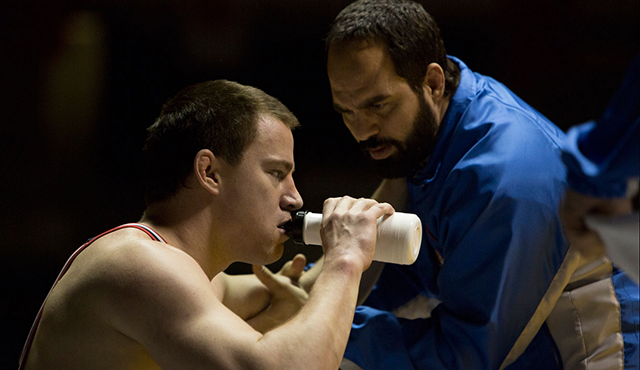“Foxcatcher” so desperately pants after an Oscar that it is hard to go into it without bias. However, despite the “Look at these comedic actors in serious roles!” impression present in the film’s trailers, “Foxcatcher” is one of 2014’s most competently made and thoroughly captivating releases.
Although “Foxcatcher” will not garner much emotional involvement from its audience, it is nonetheless entertaining. The camera regards its subjects with an intentionally cold eye, a perspective supported by both the perceived distance the viewers experience themselves and the wintry setting of the film. Based on a true story to which some may already know the ending, “Foxcatcher” frames its doomed characters in a setting worthy of their circumstances.
On paper, “Foxcatcher” is a movie about a very rich man who founded a wrestling team and the complications that ensued. On screen, it is a meticulous psychological examination of the people intimately involved with Team Foxcatcher and an analysis of why events happened as they did.
Though many people like to categorize movies featuring sports as sports movies, “Foxcatcher” is anything but. The sport of wrestling serves as a device that allows exploration of the psychological states of the film’s three main characters. It is hard to imagine that in the carefully shot wrestling scenes between the core three characters, audiences are not supposed to detect flashes of physical closeness, homoeroticism and shifts in dynamic.
The three leads, Steve Carell, Channing Tatum and Mark Ruffalo, play against type to great result. Tatum fully embodies Mark Schultz, an athlete who depends excessively upon his merit in the eyes of others. He locks his jaw when frustrated, gazes at John du Pont (Carell, as Mark’s father figure, friend and idol) with concealed joy, and faces his own reflection while brimming with self-hatred.
It’s funny that as the generally well-received and well-liked Steve Carell ventures to play roles that audiences characteristically do not associate with him, producers seek to disguise him beyond recognition. In his role as Gru in “Despicable Me,” he adopts a thick indefinable accent, and now in “Foxcatcher” he looks like another person entirely. Typically a comedic powerhouse, Carell effortlessly assumes an icy eccentricity as du Pont, further substantiating his range as an actor.
Ruffalo balances the aggression, aloofness and dissatisfaction of his costars in his role as Dave Schultz, Mark’s older and more talented brother. The summation of Ruffalo’s character occurs when Dave is asked in an interview what Coach du Pont has been to him. A mentor? A hero? Dave comes up blank.
The driving force of “Foxcatcher” dwells in the extent to which the characters base their individual worth in the opinions of others. As Mark frantically endeavors to surpass his brother for once in his life and as du Pont repeatedly appeals to his mother to finally be proud of him, they seek personal validation.
The scene that best captures the movie’s thesis features du Pont releasing his mother’s prized horses, those that always took priority over his personal accomplishments, immediately after her death. Du Pont watches vacantly as the horses disperse from their enclosure, as the film indicates that he may never be free from his mother’s sense of disappointment in him. He will never be validated as a coach, as a father, as a person.
“Foxcatcher” is quiet and chilling, a true crime drama that is elevated by its performances and stylized atmosphere.
“Foxcatcher” is currently playing in select theaters, and will be gradually assuming a wide release throughout January.








